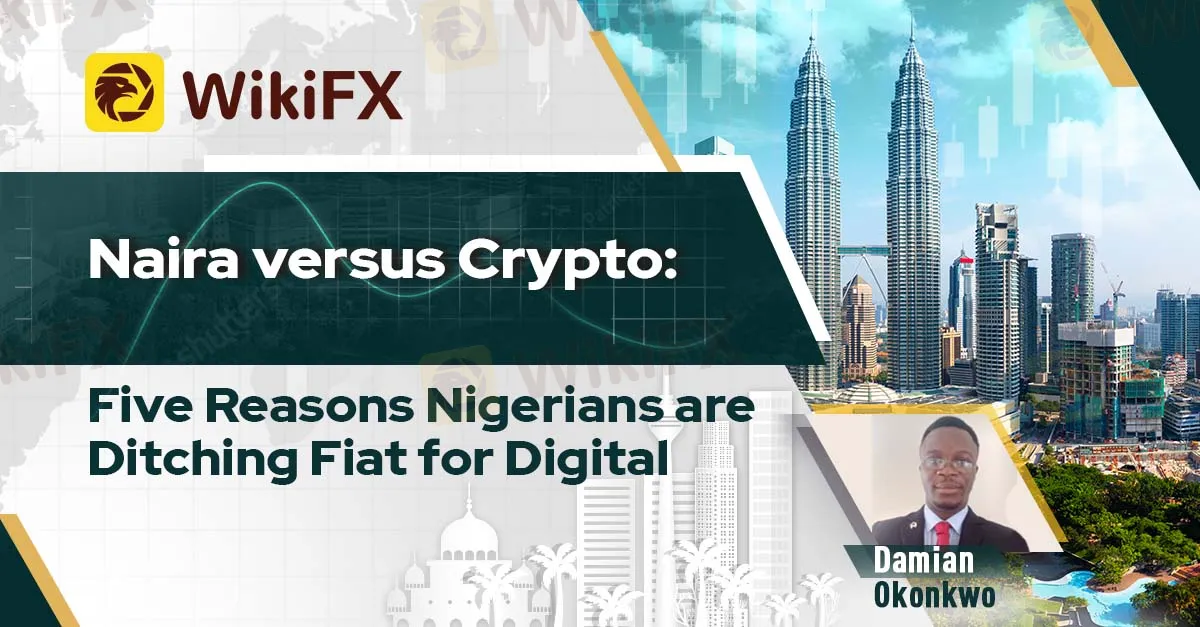简体中文
繁體中文
English
Pусский
日本語
ภาษาไทย
Tiếng Việt
Bahasa Indonesia
Español
हिन्दी
Filippiiniläinen
Français
Deutsch
Português
Türkçe
한국어
العربية
Naira versus Crypto: Five Reasons Nigerians are Ditching Fiat for Digital
Abstract:The shift from traditional fiat currencies to cryptocurrencies in Nigeria is a multifaceted phenomenon driven by factors ranging from financial inclusion to economic uncertainties. While this trend presents new opportunities for individuals, it also raises challenges for regulatory bodies to adapt and establish frameworks that ensure consumer protection and financial stability.

By: Damian Okonkwo

Introduction
In recent years, Nigeria has experienced a significant shift in its financial landscape as more and more individuals are turning away from traditional fiat currencies, such as the Naira, in favor of digital currencies, particularly Bitcoin and altcoins. This growing trend raises several questions about the factors influencing this shift and its potential implications for the Nigerian economy. In this article, we will explore five key reasons why Nigerians are increasingly embracing cryptocurrencies over traditional fiat currencies.
Five Key Reasons Why Nigerians are Increasingly turning to Cryptocurrencies over Traditional Fiat Currencies
Here are some of the major reasons why Nigerians are increasingly turning to Cryptocurrencies over traditional fiat currencies:
a) Financial Inclusion and Accessibility: One of the primary reasons driving the adoption of cryptocurrencies in Nigeria is the issue of financial inclusion. Despite being the largest economy in Africa, a significant portion of the population still lacks access to basic banking services. Cryptocurrencies, with their decentralized nature, provide an avenue for the unbanked and underbanked to participate in the financial system. The ease of access to cryptocurrencies through mobile devices has been a game-changer, allowing Nigerians to engage in financial transactions without the need for a traditional bank account.
b) Remittances and Cross-Border Transactions: Nigeria has a large diaspora, with many Nigerians living and working abroad. The traditional methods of sending money across borders are often costly and time-consuming. Cryptocurrencies offer a more efficient and cost-effective alternative for remittances. Blockchain technology enables faster and cheaper cross-border transactions, reducing the reliance on traditional remittance services and the associated fees. As a result, many Nigerians are turning to cryptocurrencies to send and receive money internationally.
c) Currency Depreciation and Economic Uncertainty: The Naira has faced a history of volatility and depreciation, leading to concerns about its stability as a store of value. Cryptocurrencies, particularly Bitcoin, are often viewed as a hedge against economic uncertainty and currency devaluation. Nigerians, seeking a more stable and resilient form of wealth preservation, are increasingly turning to cryptocurrencies as a means of protecting their assets from the inflationary pressures often associated with fiat currencies.
d) Youthful Population and Tech-Savvy Culture: Nigeria has a youthful population, with a significant percentage of the demographic being tech-savvy. The younger generation, comfortable with digital technology, is more inclined to explore and adopt new financial instruments, including cryptocurrencies. The rise of cryptocurrency exchanges and wallets that are user-friendly and accessible via mobile apps has played a crucial role in attracting this demographic to the world of digital currencies.
e) Entrepreneurial Opportunities and Investment Potential: Cryptocurrencies offer Nigerians new avenues for investment and entrepreneurial activities. The decentralized nature of many cryptocurrencies allows individuals to participate in projects and investments that may not be feasible within the traditional financial system. The allure of potential high returns and the democratization of investment opportunities are enticing many Nigerians to diversify their portfolios by including digital assets.
The Future of Cryptocurrencies in Nigeria
The future of cryptocurrencies in Nigeria appears dynamic and full of potential. As the government, regulators, and industry participants navigate the evolving landscape, finding a regulatory framework that encourages innovation while mitigating risks will be essential. If successful, Nigeria could position itself as a regional hub for cryptocurrency adoption, fostering economic growth and financial inclusion.
Conclusion
The shift from traditional fiat currencies to cryptocurrencies in Nigeria is a multifaceted phenomenon driven by factors ranging from financial inclusion to economic uncertainties. While this trend presents new opportunities for individuals, it also raises challenges for regulatory bodies to adapt and establish frameworks that ensure consumer protection and financial stability. As the crypto landscape in Nigeria continues to evolve, it will be crucial to monitor how the government, financial institutions, and the public respond to this paradigm shift in the country's financial ecosystem.

Disclaimer:
The views in this article only represent the author's personal views, and do not constitute investment advice on this platform. This platform does not guarantee the accuracy, completeness and timeliness of the information in the article, and will not be liable for any loss caused by the use of or reliance on the information in the article.
Read more

Malaysian Authorities Crack Down on 12M Cross-Border Forex Scam
A sophisticated cross-border Forex investment scam has recently come to light in Malaysia. The Commercial Crime Investigation Department (CCID) of Bukit Aman receiving 51 police reports related to the incident. The scam, which has resulted in total losses nearing RM12 million, involved a network of individuals from Malaysia and Indonesia.

FxPro Launches BankPro: Digital Banking with Trading and Forex
FxPro launches BankPro, a game-changing private digital bank with multi-currency accounts, Visa Platinum cards, and seamless investment & trading features.

Octa Unveils Festive Promotion with Bonuses and Prizes This December
Octa, a globally licensed broker, has announced its ‘Octa New Year’ promotional campaign, running from 2 to 27 December 2024. The initiative, guided by the theme ‘Trading that feels like home’, offers deposit bonuses, reduced spreads, and a live prize draw to enrich the trading experience during the holiday season.

eToro Pushes U.S. IPO Plans Amid $1.7B Valuation Drop
eToro plans U.S. IPO for Q2 2025 despite valuation drop from $10B to $1.7B. Goldman Sachs leads, aiming to tap crypto surge and retail trading growth.
WikiFX Broker
Latest News
MT5 IS BACK! Now Available on Play Store in India
Warning Against Kwakol Markets
LiteForex Review!! Read First, Invest Later
NY Approves Ripple RLUSD Stablecoin, Trump Predicts $1M BTC
South Korean Film 'Crypto Man' to Premiere in January 2025
Crypto.com Eyes MENA Growth with Abu Dhabi Acquisition
Win Big This Christmas with HFM’s PHP 1,000,000+ Promotion!
FxPro Launches BankPro: Digital Banking with Trading and Forex
Malaysian Authorities Crack Down on 12M Cross-Border Forex Scam
Hyderabad's Doctor Lost 11 Cr in Crypto Scam
Currency Calculator


